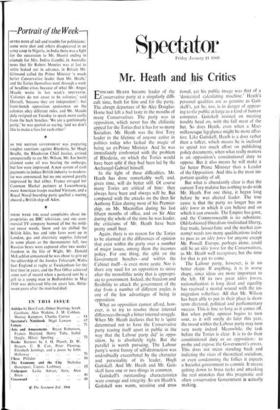Mr. Heath and his Critics
EDWARD HEATH became leader of the Conservative party at a singularly diffi- cult time, both for him and for the party. The abrupt departure of Sir Alec Douglas- Home had left a bad taste in the mouths of many Conservatives. The party was in opposition, which never has the chiliastic appeal for the Tories that it has for so many Socialists. Mr. Heath was the first Tory leader in the lifetime of anyone active in politics today who lacked the magic of being an ex-Prime Minister. And he was immediately confronted with the problem of Rhodesia, on which the Tories would have been split if they had been led by the Archangel Gabriel himself.
In the light of these difficulties, Mr. Heath has done remarkably well; and, given time, will do better still. Of course many Tories are critical of him : they always have been and always will be. But compared with the attacks on the then Sir Anthony Eden during most of his Premier- ship, on Mr. Macmillan during his last fifteen months of office, and on Sir Alec during the whole of the time he was leader, the criticisms of Mr. Heath have been pretty small beer.
Again, there is no reason for the Tories to be alarmed at the differences of opinion that exist within the party over a number of major issues, among them the incomes policy. For one thing, the split on the Government benches—and within the Cabinet itself—is even more acute. Nor is there any need for an opposition to strive after the monolithic unity that is appropri- ate to government. Indeed, the freedom and flexibility to attack the government of the day from a number of different angles is one of the few advantages of being in opposition.
What an opposition cannot afford, how- ever, is to try to resolve these internal differences through a bitter internal struggle. When Mr. Heath declares that he is 'quite determined not to have the Conservative party tearing itself apart in public in the way that the Labour party did' in oppo- sition, he is absolutely right. But the parallel is worth pursuing. The Labour party's worst frenzy of self-destruction was undoubtedly exacerbated by the character and personality of its leader, Hugh Gaitskell. And Mr. Heath and Mr. Gait- skell have one or two things in common.
Gaitskell's outstanding characteristics were courage and integrity. So are Heath's. Gaitskell was warm, sensitive and emo- tional, yet his public image was that of a `desiccated calculating machine.' Heath's personal qualities are as genuine as Gait- skell's, yet he, too, is in danger of appear- ing to the public at large as a kind of human computer. Gaitskell insisted on meeting trouble head on, with the full meat of the bat. So does Heath, even when a Mac- millanesque leg-glance might be more effec- tive. Like Gaitskell, Heath is a doer rather than a talker, which means he is inclined to spend too much effort on publishing policy documents, when what really matters is an .opposition's constitutional duty to oppose. But it also means he will make a far better Prime Minister than a Leader of the Opposition. And this is the most im- portant quality of all.
But what is abundantly clear is that the current Tory malaise has nothing to do with Mr. Heath. For one thing, it began long before he was elected leader. The true cause is_ that the party no longer has art idee force in which it can believe and on which it can crusade. The Empire has gone, and the Commonwealth is no substitute. Old-fashioned liberalism (individual liberty, free trade, laissez-faire and the market eco- nomy) needs too many qualifications today to pass as an idee force for anyone except Mr. Powell. Europe, perhaps alone, could still be an Mee force for the Conservatives, as Mr. Heath well recognises; but the time for that is yet to come.
The Labour party, however, is in no better shape. If anything, it is in worse shape, since ideas are more important to the left. Of its two great ideas forces, nationalisation is long dead and equality has received a mortal wound with the im- migration volte-face. All that Mr. Wilson has been able to put in their place is short- term electoral, political and parliamentary success. This is fine so long as it comes off. But when public opinion begins to turn sour, as it will surely do later this year, the mood within the Labour party may turn very nasty indeed. Meanwhile, the task before the Tories is clear. It is to do their constitutional duty as an opposition : to probe and expose the Government's errors. This does not mean standing back and indicting the vices of theoretical socialism, or even condemning the follies it expects a Socialist government to commit. It means getting down to brass tacks and attacking the real mistakes that this pragmatic and often conservative Government is actually making.


































 Previous page
Previous page